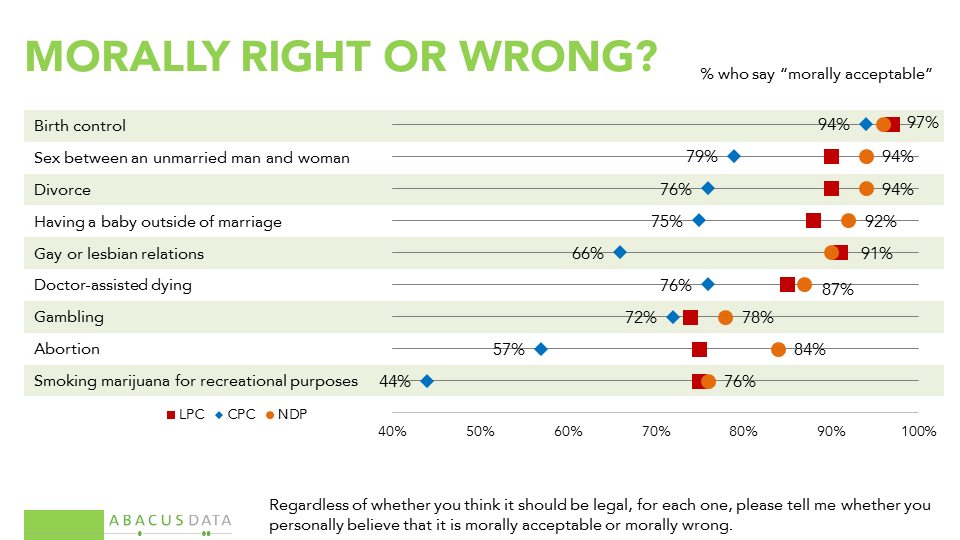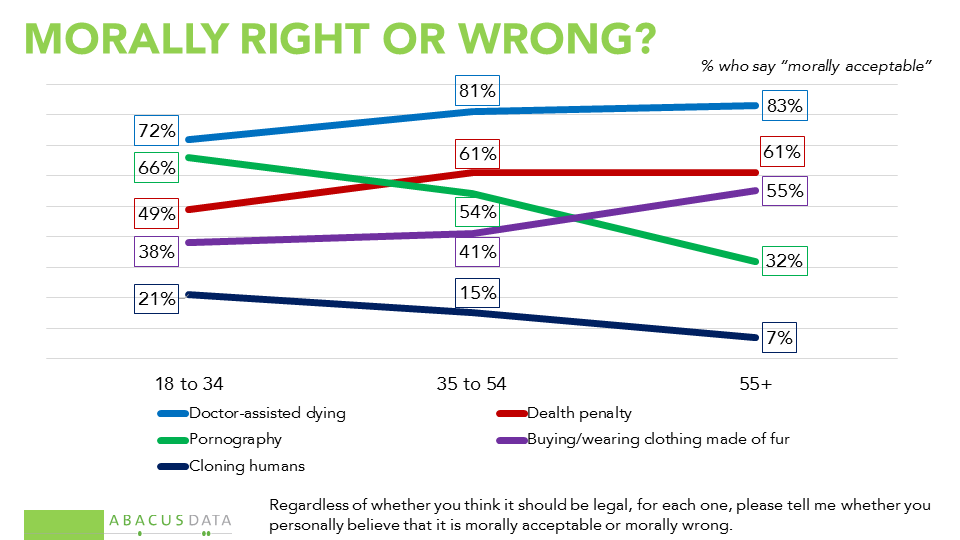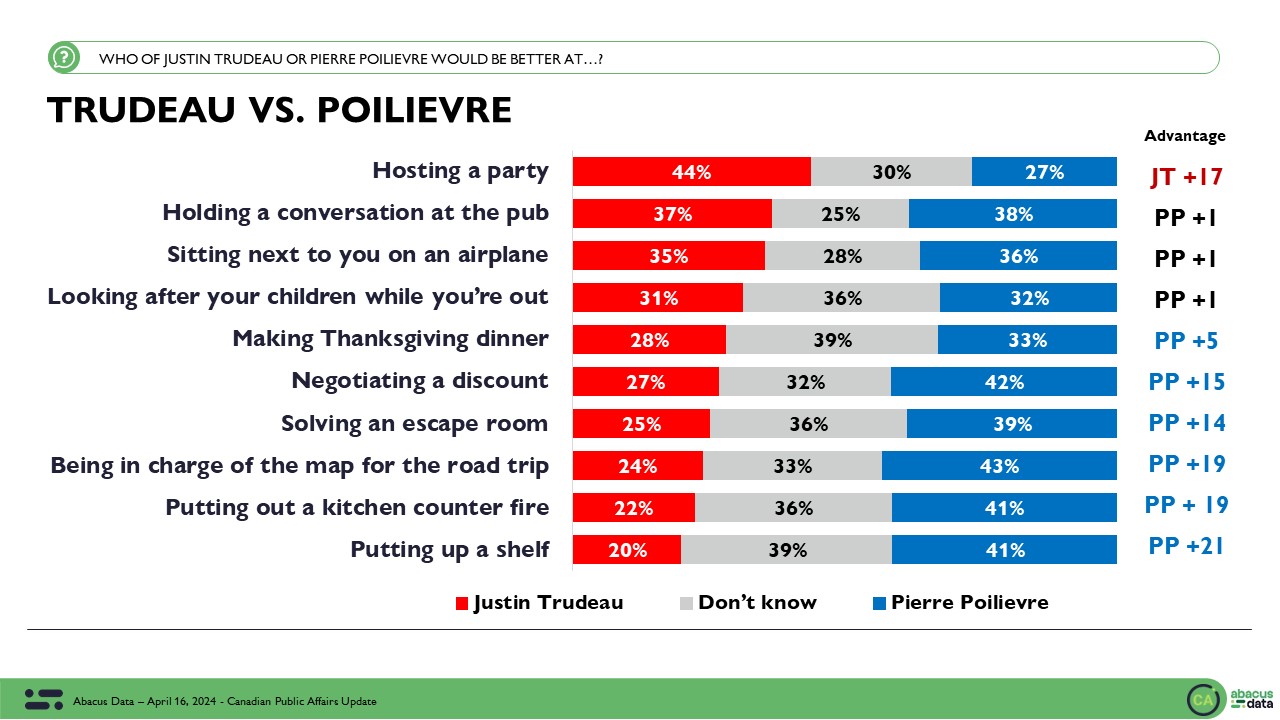CANADIANS’ MORAL COMPASS SET DIFFERENTLY FROM THAT OF OUR NEIGHBOURS TO THE SOUTH
July 9, 2016
Recently, the Gallup organization in the US updated a series of questions they have asked over the years about what behaviours or choices Americans consider to be moral or immoral. We decided to mirror the questions in our most recent survey of Canadians.
Here’s what we found:
• The vast majority in Canada (95%) and the US (89%) consider birth control morally acceptable. But Canadians are 22 points more likely to say it is moral to have a baby out of wedlock, (84%-62%). And 26 points more likely to say abortion is morally acceptable (69%-43%).
• Canadians are 21 points more likely to say gay or lesbian relations are moral (81% vs 60%), 19 points more likely to say that sex between unmarried people is moral (86% vs 67%) and 14 points more likely to say divorce is moral (86%-72%).
• Canadians are far more likely to feel that doctor assisted dying is morally acceptable (79%-53%).
• Interestingly, there is almost no difference when it comes to the death penalty, with majorities in both countries (58% in Canada, 59% in the US) considering it morally right.
• Canadians are 15 points more likely to think pornography in morally acceptable than Americans (49% in Canada, 34% in the US).
• Americans are more comfortable with the idea of medical testing on animals and wearing clothing made of animal fur, by 14 points. Americans are also more open to the idea of cloning animals, but most people in both countries feel this is immoral.
• Very few in either country believe it would be moral to clone a human (14% in Canada, 13% in the US).
We looked at differences across the political spectrum within Canada on these questions and found that, on many items, Liberal and NDP voters hold similar views, while Conservative voters stand a bit apart. Some examples of the differences between Liberal and Conservative voters:
• Liberals are 31 points more likely to approve of recreational use of pot (75%-44%).
• Liberals are 25 points more likely to feel gay and lesbian relations are morally acceptable.
• Liberals are 18 points more likely to say abortion is moral.
• Liberals are 9 points more likely to feel doctor-assisted dying is moral (85%-76%).
• Conservatives are 22 points more comfortable with the death penalty (75%-53%).
• Conservatives are 15 points more comfortable with wearing fur (56-41%).


Different age groups sometimes see these choices in different ways. Among the findings:
• Most of those aged 18 to 34 think pornography is morally acceptable, while most of those 55 and older don’t. Younger people are also more likely to feel human cloning is acceptable.
• Older Canadians were more likely to consider doctor-assisted dying, the death penalty, and wearing fur to be morally right.
• Feelings about recreational pot don’t vary all that much by age.
THE UPSHOT
Bruce Anderson: “Norms about what constitutes morality are evolving in many countries, including Canada and the US. These numbers give us a contemporary look at how similar or different our cultures are. The patterns do confirm a more progressive, secular and libertarian predisposition in Canada.
The data also reveal why issues of moral choice come up from time to time in our political debates. While many Conservative and Liberal voters see morality in the same way on many issues, there clearly is a subset of Conservative voters for whom morality is viewed differently. This produces an internal tension within Conservative parties, around questions such as same sex marriage and abortion, for example. The similarlities among NDP and Liberal voters help explain why NDP voters are often comfortable considering support for Liberal politicians.
On many moral issues, younger generations have been creating new, and more progressive norms for Canadian society. In my view, these numbers show that the idea of a chronic and large “generation gap” when it comes to morality, is not really evident, if it was ever true.”
MORE DATA:
Check out new releases comparing Canadian men and women and different regions in Canada.
METHODOLOGY
Our survey was conducted online with 1,500 Canadians aged 18 and over from June 14 to 16, 2016. A random sample of panelists was invited to complete the survey from a large representative panel of over 500,000 Canadians.
The Marketing Research and Intelligence Association policy limits statements about margins of sampling error for most online surveys.
The margin of error for a comparable probability-based random sample of 1,500 is +/- 2.6%, 19 times out of 20.
The data were weighted according to census data to ensure that the sample matched Canada’s population according to age, gender, educational attainment, and region. Totals may not add up to 100 due to rounding.
Abacus Data Inc.
We offer global research capacity with a strong focus on customer service, attention to detail and value added insight. Our team combines the experience of our Chairman Bruce Anderson, one of Canada’s leading research executives for two decades, with the energy, creativity and research expertise of CEO David Coletto, PhD.







